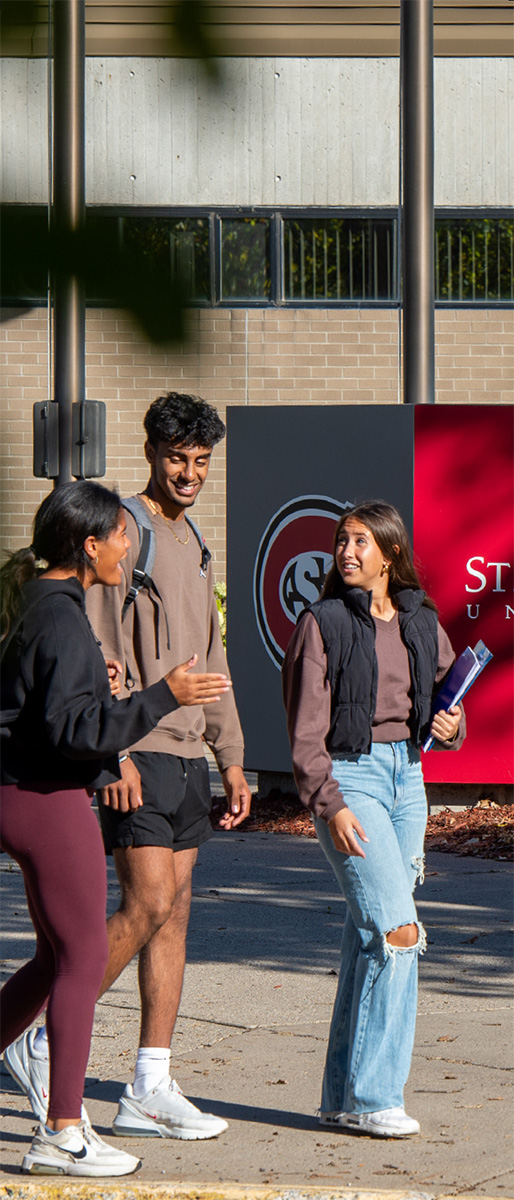Our Land Commitment
Our Land Commitment

St. Cloud State University acknowledges that we are gathering, speaking, learning, and structurally built on and within Mni Sota Makoce, the homeland of the Dakota peoples. Native Nations, including the Anishinaabe, Ho-Chunk, Cheyenne, Oto, Iowa, Hidatsa, Arikara, A’aninin, Cree, Blackfeet, Assiniboine, and the Sac and Fox, have also called this land home both before and after the arrival of European settlers. We acknowledge the painful history of genocide and forced removal of Native peoples from this territory. We honor and respect the many diverse Indigenous peoples still connected to this land on which we gather.
St. Cloud State University is committed to developing a land acknowledgment that is not just words but actions. We will actively promote education among our faculty, staff, and students on Indigenous issues, including research on the historical and ongoing harms impacting our Indigenous communities. We will also clearly outline our goals to make a positive and lasting contribution to efforts to build relationships with the Tribal Nations represented within our local and broader community. St. Cloud State University commits to creating a substantive and empathic land acknowledgment, demonstrating our continued commitment to action.
Our Commitment: EDUCATE, RESEARCH, GOALS
OUR COMMITMENT - EDUCATE:
- By recognizing and sustaining the work and scholarship of SCSU’s Indigenous faculty, staff, and students.
- By reconstituting the American Indian Advisory Board, this board will be crucial in educating, reviewing, and making recommendations on matters that create support, cultural sensitivity, and success for our American Indian students and allies.
- By recommending the creation of Learning and Teaching Institutes/Centers relevant to the education and support of employees on Indigenous matters that contribute to the institution’s mission (e.g., Equity 2030).
- By encouraging faculty to educate themselves, acknowledging the history, relative to Native peoples, that their institutions/disciplines/academies have committed.
- By sharing information about the Native Studies Summer Workshop for Educators (NSSWE) with each department/office/unit/cabinet member/division. Encourage participation or engagement with NSSWE or other Indigenous Educational Workshops/Training and encourage participants to share/present what they learned with colleagues in their department/office/unit/cabinet member/division.
OUR COMMITMENT - RESEARCH:
- By encouraging the study and examination of SCSU’s relationship to Native displacement, dispossession, and ongoing disenfranchisement.
- By encouraging the ongoing review/investigation and ultimate production of a “Report of Harms.” Coinciding with an extensive review of the inventory of all erasure acts, that should be considered for the removal or modification, including but not limited to the removal or modification of plaques, symbols, and language within SCSU’s grounds, website, and literature.
- By exploring the curriculum, especially in the education of K-12 teachers, to identify places where the history of American Indian education should be highlighted and incorporated.
- By investigating harm done to the land caused by colonial settlement, including but not limited to ecological pollutants, environmental racism, biodiversity loss, and the instability of climate change.
OUR COMMITMENT - GOALS:
- By adding this commitment statement to SCSU’s website and disseminating it to our campus and extended community.
- By encouraging research to identify how SCSU has benefited from harm to Indigenous peoples. Once determined, we will acknowledge those harms to identify possible reparative actions that we will ensure are communicated to our campus community and reflect potential harms committed by SCSU, academic disciplines, the St. Cloud Community, Higher Education, and beyond.
- By working with faculty and staff with relevant expertise, to educate the campus community on possible reparative actions and how our campus community can participate and be accountable for these efforts.
- By actively ensuring positive relationships, regular interactions/meetings, and collaborations with our American Indian Center, Native students, All Tribes Council, and, after reinstatement, the American Indian Advisory Board and others.
- By recommending alignment with the standards of American Indian Education set by the MN legislature for K-12 students with education provided to college students.
- By embedding this work as our ongoing commitment to It’s Time, Equity 2030, and the university’s assessment toward accreditation.
St. Cloud State University commits to this ongoing work and recognizes that this work does not end with a land acknowledgment. This work and the direct actions taken in the land acknowledgment will continue with the ongoing examination of harm caused and probable action we can take to correct those harms. Our commitment is to ensure our words and actions align with our goals.
Our Land Commitment is the product of a student-led collaborative effort, specifically our All Tribes Council Student Organization. The students who led and contributed to this work were: Justus Probst, Dustin Gregg, Chandra Colvin, Emma Needham, Makale Prescott, Kylah Russell, Sean Dilley, and Lydia Krueger. They were supported by Professors Iyekiyapiwin Darlene St. Clair, Melissa Prescott, Kelly M. Branam Macauley, Ruthanne Kim, Rob Mann, Robert Galler, and Jamie Opper; by staff Lacey Lokken, BearPaw Shields, and Angela Lien of the American Indian Center; and by Vice Presidents Chocoletta Simpson and Katrina Rodriguez, and President Robbyn Wacker.